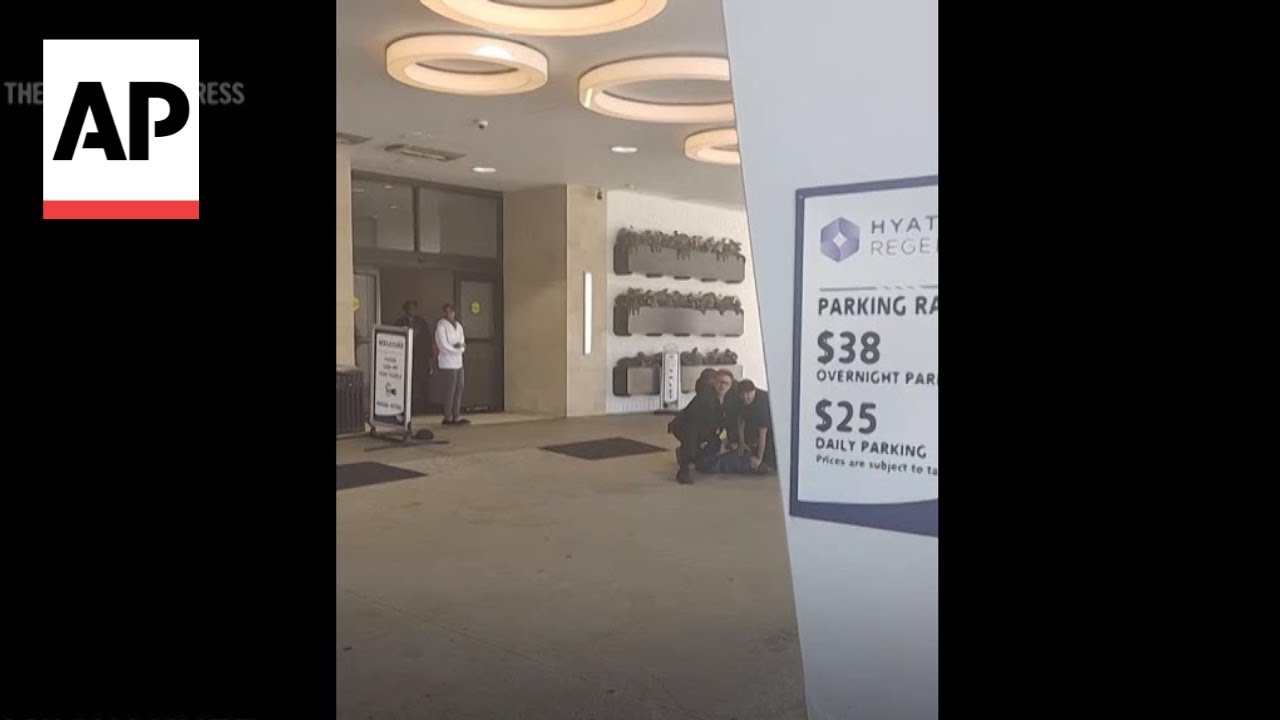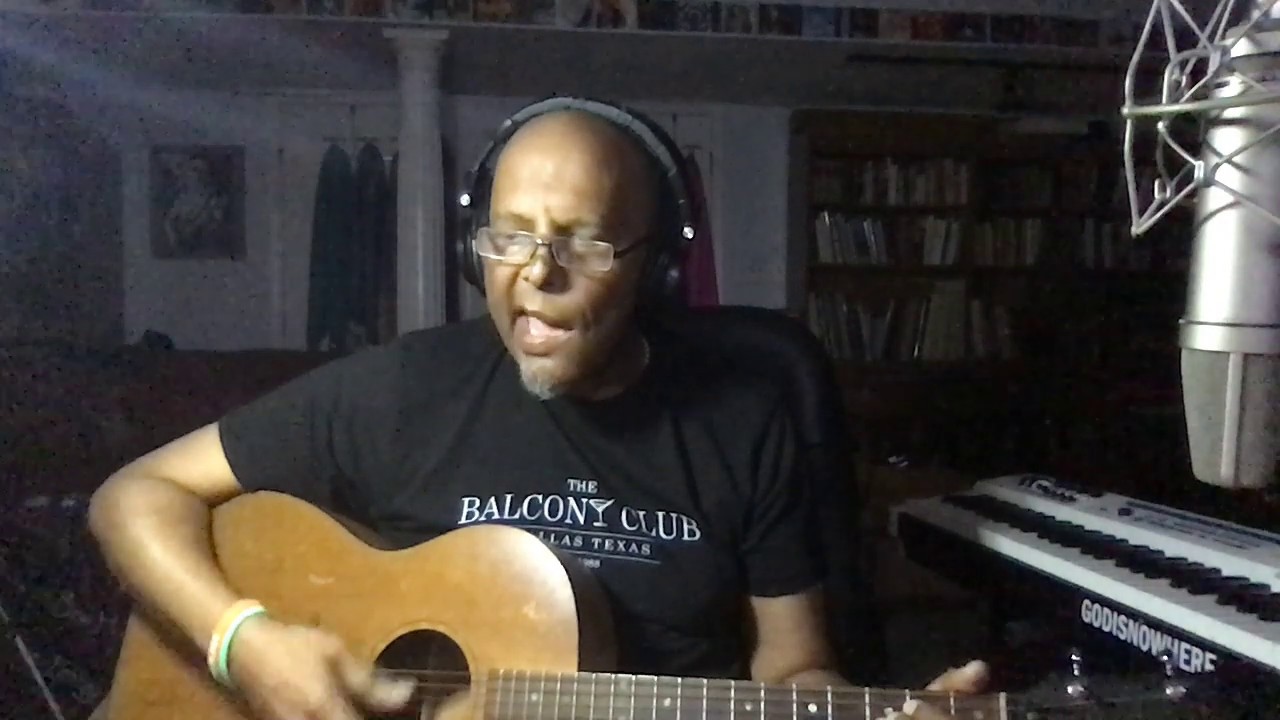Black men killed by a knee on their neck too common
In a haunting, ghastly reprise, Thursday saw the funeral of D’Vontaye Mitchell, a black man in mental distress killed by four security guards outside a Milwaukee hotel – one of the sites for next week’s GOP convention, yet. Like George Floyd, witness video shows Mitchell face down and gasping for air as he begs, “Please, please….” His wife: “They treated him like he was worthless, an animal.” Singer Tom Prasada-Rao in $20 Bill, his searing lament for Floyd: “Oh brother, I never knew you/ Now I never will.”
D’Vontaye Mitchell, a 43-year-old father of two, was killed June 30th outside Milwaukee’s Hyatt Regency Hotel as he was held down by four security personnel who’d dragged him out after he entered the women’s bathroom. Hotel footage reportedly shows Mitchell frantically running from something or someone unknown to hide in the bathroom; confronted by the guards, he had his hands up. During the assault outside, video shows him pinioned on the ground being beaten with batons as he grunted, struggled to breathe, and begged them to stop; at one point, a guard turns to the passerby filming and snarls, “This is what happens when you go into the ladies room.” Mitchell’s “last words on this earth,” noted civil rights attorney Benjamin Crump, were “please, please, please, please, please, please,” followed by “I’m sorry” two times, “I can’t breathe,” and “Please help me.” “How many more, America?” asked Crump. “How many more Black men have to say ‘I can’t breathe?’”
“To see them beat him over and over and over…” said Mitchell’s wife DeAsia Harmon of the pitiless encounter. “They could have stopped at any time.” At a press conference, she stood with Mitchell’s family, including their 8-year-old daughter, Michell’s former girlfriend Luella Jackson, and her and Mitchell’s six-year-old son. “Our children deserve justice for their father,” said Harmon. “They took everything from them… We stand together on this.” Until this week, no one had been charged in connection with Mitchell’s death despite a preliminary finding from the county medical examiner’s office his cause of death was homicide; the four guards had been put on leave, and police had declined to release video of the encounter. “I just want justice for my son, and I want it now,” said Mitchell’s mother Brenda Giles, who insisted the death won’t be “swept under the rug.” “Give us those videos. Y’all know what went on inside the hotel. Y’all saw it, but we can’t see it. Make that make sense.”
This week, ten days after his death and amidst angry protests, changes came in quick succession. The guards were finally fired by Aimbridge Hospitality, which runs the hotel, hours after the Hyatt demanded they be fired and face criminal charges. And Thursday, Milwaukee police referred four charges of felony murder to the D.A.’s office. Still, no arrests have been made, purportedly awaiting final autopsy results – a lapse blasted as “appalling” by attorney Will Sulton, representing the family along with Crump and B’Ivory Lamarr. Sulton noted the charges came only after community calls for accountability – “It was onlookers and family gathering evidence (which) led us here” – in the killing of a distressed, unarmed man “trying to run for his life.” Sulton added there’s footage of the guards denying they struck Mitchell, “even though that’s all on camera – you see them punching, kicking, hitting him with a baton…It is just outrageous.” See below. Warning: Like all that have come before, gruesome.
For many, Mitchell’s killing bitterly echoed that of George Floyd, likewise dead from a heedless white man’s knee on his neck, in the harsh light of day, for all to witness. At the time, the sight hollowed out Tom Prasada-Rao, a beloved songwriter, “pillar of grace and talent” and “musician’s musician” who died June 19 at his home in Silver Spring, Md of cancer at 66. Born in Ethiopia of Indian descent, Prasada-Rao performed for decades in multiple bands – the Dreamsicles, the Sherpas, Fox Run Five – usually in an Indian kurta , or tunic. But he was perhaps best known for, and most fond of, $20 Bill, the simple, mournful benediction for George Floyd he wrote in late May 2020 after, ravaged by chemotherapy for Stage IV cancer, he’d sat on his sofa and watched news coverage of the swirling protests. He was exhausted; the protests “broke his heart,” and the lyrics “just came tumbling out of me.” He recorded it on the couch, his voice soft, raspy, subdued, apologizing he was “not at my best.”
“Some people die for honor/Some people die for love/ Some people die while singing/to the heavens above,” he sang. “Some people die believing/in the cross on Calvary Hill/And some people die/in the blink of an eye/for a $20 dollar bill.” Noting, “Oh brother, I never knew you/Now I never will,” he promises, “I’ll remember you still.” “Let this be our communion/Time to break the bread/Do this in remembrance/Just like the good book said/,” he sings. “Sometimes the wine is a sacrament/Sometimes the blood is just spill/Sometimes the law is the devil’s last straw/A future unfulfilled….For a 20 dollar bill.” He falls silent, then whispers, “Rest in peace.” Ever “the grand collaborator – he never met a stranger” – he posted the chords, inviting others to cover it. Over 100 did; his favorite was by Karl Werne. Then, and at a recent celebration of his life, family and dear friends thanked him for giving “voice to the anguish of the moment” and helping them heal. To make beauty out of such savagery, said one, “is an exultation of the best in us.”
For D’Vontaye Mitchell’s family and friends, it is too soon for healing. At his funeral Thursday at Milwaukee’s Holy Redeemer Church of God in Christ, they remembered how Mitchell loved to dance, rap, cook and help others even as they vowed, per his mother Brenda, “We going to fight.” Reading from Psalms, she said they “shouldn’t worry about the injustice that’s been done to D’Vontaye, because they will get their just due…God is going to make sure it comes to pass.” Rev. Al Sharpton also called on a higher power for justice against those who in 2024 still think of black men as “the least of us” thanks to a long, ugly history in America, from slavery to George Floyd, that made it so. “We want the people in this town and others (to know that) who you consider the least, God consider the most,” he said. “You never thought folk like us would be coming to stand up for D’Vontaye. But you will be held accountable when you put your hands on us.”
Benjamin Crump and several others noted the irony of Mitchell being killed outside one of three main venues for next week’s Republican convention where, “Y’all got a crowd coming to town to talk about making America great again.” Improbably, he argued justice should be part of the narrative: “We got two justice systems in America – one for Black America and one for white America.” For proof, he called out Mitchell’s name, then many others – George Floyd, Breonna Taylor, Eric Garner, etc. “We going to help you D’Vontaye,” Crump said, brandishing a metal baton he said was used to beat Mitchell, then naming each member of his family. “When they hit him, punch him, and beat him, it was like they were beating us all.” He again cited Mitchell’s final words – “Please, six times, while gasping for breath” – to “Please help me.” “How many more?” he asked the mourners angrily, rhetorically. “After the video of George Floyd, you say, ‘My God, not again. You’d think we would have learned our lesson.”






